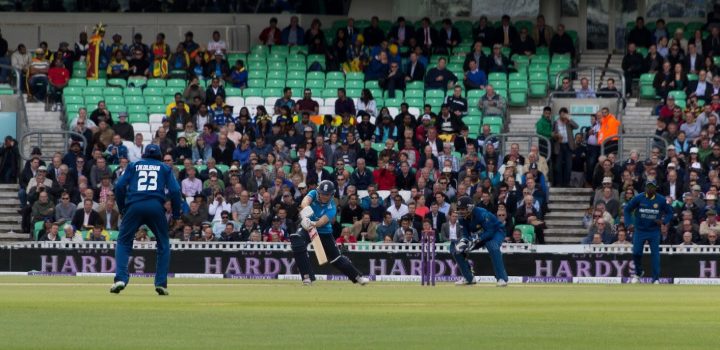Let’s take a look at the piece by Mike Selvey, chief cricket correspondent of the Guardian, which has ruffled a lot of feathers during the last twenty four hours or so.
For those unfamiliar with his work in recent months, Selvey (above) has acquired a reputation as a Pietersenphobe, a Flowerite, and an apologist for the establishment. He described Paul Downton’s performance as “excellent”.
This is his first outing since the Pietersen book, and has already been the subject of insightful discussion at Dmitri Old’s blog.
He offers some praise – of a kind – for Pietersen.
Pietersen has been a sportsman of supreme gift, a unique batsman, a fearless seat-of-the-pants player capable of transforming a match perhaps like no other of his generation. No one who has had the privilege of watching him at close quarters since his memorable debut series can fail to say they were not the best of times. Pietersen does not warrant being remembered as a sour, vindictive man.
Alas, Selvey then wheels out a series of tired canards which stuck in my craw – and you may well feel the same.
First comes the idea, again, that Pietersen played only for himself.
Kevin Pietersen never really fitted the sporting mantra of no ‘I’ in team. In cricket, the individual performance matters, but always, for the greatest impact, it has to be channelled towards the collective end.
So it was instructive to find that towards the end of the inevitable circuit of soft, carefully tailored interviews and appearances to promote his book, the most telling remark to Kevin Pietersen, the only one that cut through the PR pap, came from the chatshow host Graham Norton. It was an uncomfortably gauche appearance by Pietersen, sat on a sofa alongside a worryingly unfunny John Cleese and an utterly bemused Taylor Swift, and towards the end Norton, who did not appear to much care for his guest, cut to the chase. “I want to put this nicely,” he said to Pietersen, “but reading the book, it strikes me that maybe, just maybe, team sport’s not for you?”
Now there is a withering truth.
Leave aside for the moment the obvious pleasure Selvey derives from Pietersen’s awkward performance on Norton (if medals were given for uncomfortable gaucheness on TV, Alastair Cook would have a chest-ful).
Focus instead on the notion that Pietersen played only – and cared only – for himself. What is the evidence for this?
I guess he’s referring to Pietersen’s tendency to perish to attacking strokes. But I’ve never seen the logic in this observation. How was that selfish? How can any batsman be?
Let’s imagine that Batsman X is only concerned with his own interests and personal outcome. He will surely resolve to score as many runs – for himself – as possible, and therefore try bat for as long as possible. This is just as useful for the team as for him individually. The mutual benefit is indivisible.
Conversely, losing his wicket does the selfish batsman no good.
Pietersen’s responsibility, as he saw it, was to try to win a session for England by going on the attack. His role was to complement the more cautious approach of Cook, Trott and Bell around him. You could easily argue that by risking his wicket in furtherance of team interests, rather than introspectively batting for survival, he was selfless, not selfish.
But back to Selvey:
With the exception of Andy Flower, wisely keeping his own counsel, and, despite his notorious inadvertent comment, Andrew Strauss, no one has emerged from the past nine months with dignity intact.
Hmm. Strauss, unprovoked and in cold blood, called Pietersen an “absolute c***” on live television. That’s quite a big ‘despite’.
How intact is Flower’s dignity? Beyond Pietersen’s own accusations, and strong circumstantial evidence that Flower betrayed private conversations to the press, we have the ECB dossier, which portrayed Flower as a bizarre and tyrannical ego-maniac. He made notes about Pietersen looking out of the window. He may have asked players and management to spy on Pietersen. He created a culture in which Prior and Cook felt obliged to report back details of a private meeting.
And what about the story in Pietersen’s book, highlighted on these boards yesterday by Clivejw.
“You may remember that before the Winter Ashes, Pietersen was given compassionate leave to arrive late in Australia so as to attend the funeral of a close friend. That friend was Jon Cole-Edwardes, whom Pietersen describes as “my best friend since our childhood together in South Africa” and “another brother to me.” KP’s loyalty to his oldest friends and his family is a constant theme throughout the book (not that you’d know it from the reviews).
“A year before, after so-called text-gate, before “reintegration,” KP held a golf day at Tring to raise funds for the JCE Trust, a charity set up by Cole-Edwardes, who was dying from a rare form of eye cancer. This took place between two of England’s one-day games against South Africa in September, for which KP was not, of course, picked.
“Pietersen invited some of the England players to join him in Tring (he doesn’t say who or how many)”.
Sky Sports News were there, and did a report to camera. Flower saw it. The players who had come to support the cause were there because they were my buddies. They knew what was going on in my life; they knew about my friendship with Jon. Flower tore a strip off each of them.
Phone calls. What the fuck do you think you are doing? You are not supposed to be there. You are not supposed to be supporting him.
They weren’t supporting me. They were supporting Jon.
The guys rang me and said, you won’t believe who has just been on the phone!
Who?
Flower.
All through that summer he left me twisting in the wind. He never once backed me in public. He never once tried to put the fires out.
I understood why when I heard about those calls.
Still think his dignity – and famous “integrity” – are intact, Mike?
And then comes the kicker:
Even given the strength of their case against Pietersen, which extends way beyond the pathetic leaked charge sheet, in terms of public relations, the England and Wales Cricket Board has been knocked into a cocked hat by Pietersen: whoever he employed has earned their corn 10 times over.
Er…so what is the case against him? Care to share it with this us? If it extends “way” beyond the dossier, then to what? You are the Guardian’s correspondent – isn’t your job to tell us these things, not just expect us to take your word for it?
As Guardian commenter Moossyn remarks:
You keep saying you know explosive things, ‘if you knew what i know’ etc.. etc. Certainly the biggest cricket story of the year and the chief cricket writer of this paper will not tell the readers of the paper what he knows.
Our own contributor Tregaskis landed the knockout punch:
I am struck how, during the period of the confidentiality agreement, the ECB leaked like a Chernobyl reactor as the firefighters at Lords desperately tried to stop its public relations efforts going into meltdown. Mike Selvey teased us all with stuff he knew but could not reveal. John Etheridge actually revealed the existence of a on-existent four-page dossier crammed with 50 misdemeanours. Alastair Cook expressed his frustration at the legal constraints that prevented him from giving his side of the story. Paul Downton was forced to apologise for over-eagerly breaching the agreement with barbs wired to alleged disinterestedness. The cricketing world has held its bated breathe as the embargo wound down like the Little Boy timer ready to unleash its nuclear revelations. Now, two weeks after the confidentiality agreement expired, with all parties freed to tell their truth, Paul Downton has lost his voice, Alastair Cook is as quiet as a church mouse, and the original four-page dossier has been reinvented as a five-page dossier recently compiled as a draft due-diligence document in response to Pietersen’s book,
Selvey rightly describes the new incarnation of the dossier as pathetic. This serves both to synthesise its actual worth and also to elevate the value of his self-proclaimed personal knowledge of how strong the ECB’s case against Pietersen actually is. In the words of Tony Mareno in Saturday Night Fever, “Why are you such a cock-tease?” Selvey constantly attempts to seduce us with his inside knowledge but always fails to deliver. The question most of us are asking is this: if the ECB has such a strong case, why did it fail to include the coups de grace in the most recent dodgy dossier? Mike, if you are right, then the ECB has just overseen yet another major failure of due diligence. The ECB are either dissemblers or incompetent.
Selvey continues by hinting again, gnomically, at some insider knowledge.
Unquestionably, he deserved a better exit than the back door, although I do know that the intention was to have feted him properly when the dust settled.
Really? What exactly was planned? In February, Paul Downton unceremoniously sent Pietersen packing – bringing down a nine year career of 13,000 runs with a five minute meeting in a St John’s Wood hotel. Are we to believe that – had it not been for the book – the ECB were about to celebrate his career with a ticker-tape parade, Lord’s reception and mass genuflection?
Pull the other one.
Turning now to the question of Pietersen’s output, Selvey continues.
Pietersen’s career can almost be divided into two halves. In the first, involving 45 Tests, up until when he lost the captaincy at the end of 2008, he averaged more than 50 and scored 15 hundreds. Since then, a further 59 Tests, when he should have been at his peak, brought a decline to an average of 44 and only eight hundreds (gradually hampered by achilles and knee problems, although what centuries some of them were) against averages of 49 for Cook and Ian Bell, with 18 and 12 hundreds respectively, and one of 46 with nine hundreds from Trott. Riches elsewhere manifestly began to intrude on and take precedence in his thoughts.
This is a remarkably similar argument to Martin Crowe’s. Both are flawed. If Pietersen’s centuries became fewer after losing the captaincy, what evidence pins that to his shifting spheres of influence – that he was motivated more by IPL paycheques than England? He had been crudely sacked for the crime of sending an e-mail. If anything defocused him, was it his his dented confidence – and sense of betrayal – rather than greed?
Did Pietersen train less diligently after January 2009? Did he work or try less hard? Did he conspicuously care less about scoring test runs?
In his first post-captaincy innings he top-scored with 97. He missed most of the 2009 Ashes due to injury. In 2010 he lost form, but after his Adelaide double century he top scored in 2011 against India, with 533 runs at 106. We all know what he did in 2012.
On Twitter, Dave Tickner put it this way:
Leading Test runscorers during Kevin Pietersen's decline: pic.twitter.com/ud6X45TuE1
— Dave Tickner (@tickerscricket) October 14, 2014
You can manipulate stats in all directions. For example, in his last seventeen tests, Alastair Cook has scored zero centuries.
But there’s more.
I take issue with those who postulate management failure in Pietersen’s decline. It would appear then that there has also been management failure at every stop on the journey, from Natal, via Cannock, Nottinghamshire, Hampshire, and England. Is there not a common element here?
What was the management failure at Natal? Didn’t Pietersen leave for (in his view) pragmatic reasons? What happened at Cannock? And wasn’t he in fact well regarded at Hampshire, moving on because of inconvenient geography? At Nottinghamshire, Mick Newell thought he was difficult – but not enough to sack him. Any animosity he caused at Trent Bridge derived mainly – it seemed – from his decision to quit.
And finally:
Pietersen, meanwhile, cuts a sorry, if wealthy figure, hawking himself round the franchises of the world, playing mediocre cricket by his standards in mediocre teams in India and the Caribbean.
Whose fault is it, exactly, that Pietersen is not playing test cricket? Given his expulsion, what do you expect a sacked man to do? Doesn’t he have a right to work and earn money? Why sneer?
As the Independent’s Stephen Brenkley might have put it, “this will not do…it really will not”. Selvey is correspondent of a newspaper of record. He should look at the story from the public’s point of view, not Andy Flower’s, and recognise the levels of anger, incomprehension and frustration.
He has a responsibility to hold the ECB to account and put the questions which desperately require answers. Where are Paul Downton and Giles Clarke hiding? Why was Pietersen fired? Was there bullying? Why has so much confidential information about employees found its way into newspapers? Explain the dossier. Why did someone make a note of Pietersen looking at his watch? How rigorous was the inquiry into KP Genius? Will there be an investigation into the claims made about Flower’s conduct?
This is one of cricket’s greatest ever scandals and has once again been kicked into the long grass by the people whose job it is to uncover the facts. The likes of Selvey have opportunities to meet and speak to the principal characters; we don’t.
Think I’m exaggerating? Imagine if, in the same week, the pound collapsed on the currency markets, the Chancellor was found to be taking bribes from City banks, and the home secretary was caught dealing drugs. And then Nick Robinson came on the news to say, “I’ve just been speaking to the prime minister, and he assures me everything’s fine. He has great integrity, you know”.









